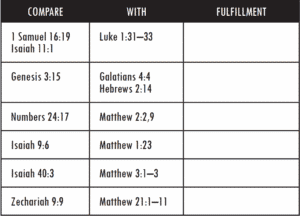LESSON TWO
The Central Person of the Bible
Jesus is the most remarkable and fascinating person in history. He has inspired more hope, taught more compassion, and shown more love than any other man who has ever lived.
Jesus is the central figure of the Bible. His birth as the Jewish Messiah and Savior of the world was prophesied by Old Testament authors. Their writings contain more than three hundred separate references to the coming of Jesus, with many unique details. Christ fulfilled 100 percent of all the Old Testament predictions of the birth, life, death, and resurrection of the Messiah.
The New Testament makes an even more revolutionary claim: that Jesus Christ is the center of all biblical prophecy. The Scripture proclaims:
Long ago God spoke in many different ways to our fathers through the prophets [in visions, dreams, and even face to face], telling them little by little about his plans. But now in these days he has spoken to us through his Son to whom he has given everything, and through whom he made the world and everything there is (Hebrews 1:1, 2).
And the Book of Ephesians declares:
God has told us his secret reason for sending Christ, a plan he decided on in mercy long ago; and this was his purpose: that when the time is ripe he will gather us all together from wherever we are—in heaven or on earth— to be with him in Christ, forever (Ephesians 1:9, 10).
The precise fulfillment of the immense body of biblical prophecy is found in one unique and revolutionary Man—Jesus of Nazareth. Claiming that he was the predicted One of old, Jesus stepped into time. And the pieces of the prophetic puzzle slipped into place. We can clearly see that he was the center of God’s revelation to man.
Lesson Objective: To recognize the entire Bible as God’s revelation of Jesus Christ to us
BIBLE STUDY
Read Acts 17 and 18
Before you consider the many verses below, be sure to read the Bible passages listed above.
If you click on the verses in the study below you can see the entire verse! If you are not on-the-go, consider opening a physical Bible and looking up the passages.
What Christ Said About Himself and the Old Testament
- What did Christ say of the Scriptures in John 5:39?
- Read Luke 24:25–27, 44–48.
What was Christ’s claim concerning the Old Testament teaching about himself?
What parts of the Old Testament did Christ say referred to him (verse 44)?
What do you think Christ wants you to understand about the Old Testament from verse 26?
From verses 46 and 47?
What the Apostles Said About Christ and the Old Testament
- What does Peter conclude in Acts 3:18?
- Keeping in mind that the New Testament had not yet been written, how did the apostle Paul use the Old Testament to show that it contained the “good news” of Christ (Acts 17:1–3)?
- What three things occurred in Christ’s life that Paul said were taught in the Old Testament (1 Corinthians 15:3, 4)?
- What does Paul conclude in Romans 15:8, 9 about the ministry of Christ?
Old Testament Prophecies Concerning Christ Fulfilled in the New Testament
All of the more than 300 Old Testament prophecies about the first coming of the Messiah were fulfilled in the life of Christ. Here are a few of them.
- Compare these Scripture references and record the prophecies fulfilled.


- What is your impression after seeing these Old Testament prophecies and their New Testament fulfillment?
Christ, the Central Person of the New Testament
- The four Gospels are the history books of Christ’s ministry. (Read Matthew 1:1; Mark 1:1; Luke 1:1–4; John 20:30, 31.)
In what ways did the disciples know Jesus (1 John 1:3)?
Do the four Gospels purport to record all that Jesus did (John 20:30)?
Why were the historical facts and teachings of Jesus Christ written (John 20:31)? - The Book of Acts is a historical account of the acts of the Holy Spirit through the apostles.
Who wrote it (Luke 1:1–4 and Acts 1:1)?
How do you think the passage in Luke applies to the Book of Acts? - The Epistles are letters written to show the church the practical outworking of the life of Christ in the lives of those who wrote them. By example, they teach us regarding our membership in the body of Christ, and about our privileges, responsibilities, and destiny.
Read Colossians 2:6–8.
What are Christians to do?
How are we to do it?
Of what are we to beware?
What would you say our greatest responsibility is? - The Book of Revelation is the only New Testament book of prophecy. Read Revelation 1:1–3.
This book is the revelation of whom?
What is its purpose?
Who gave such knowledge?
How was this knowledge given, and to whom?
How will studying the Book of Revelation affect your life and under what conditions?
LIFE APPLICATION
Questions
- How will recognizing Jesus as the central figure of the entire Bible affect your Old Testament reading?
- What do you see as your individual responsibility in fulfilling the commands of this person? See John 15:16 and Matthew 28:19, 20.
- Memorize the twelve Historical Books and write them again in your notebook:
Pre-kingdom era (3)
Kingdom era (6)
Exile and post-exile-era (3)
Review the names of all the books learned earlier.
Memory Verse: “I passed on to you what was most important and what had also been passed on to me. Christ died for our sins, just as the Scriptures said. He was buried, and he was raised from the dead on the third day, just as the Scriptures said.” (1 Corinthians 15:3, 4 NLT)